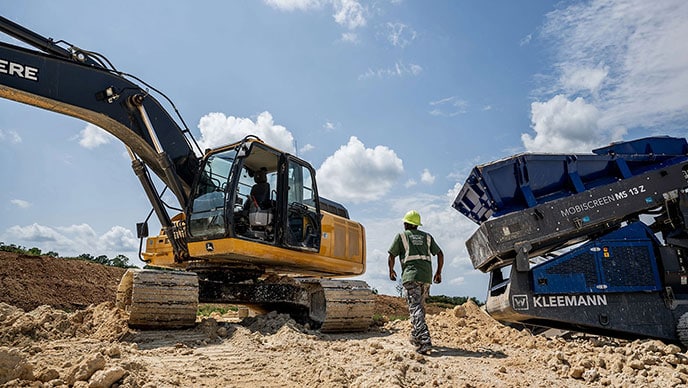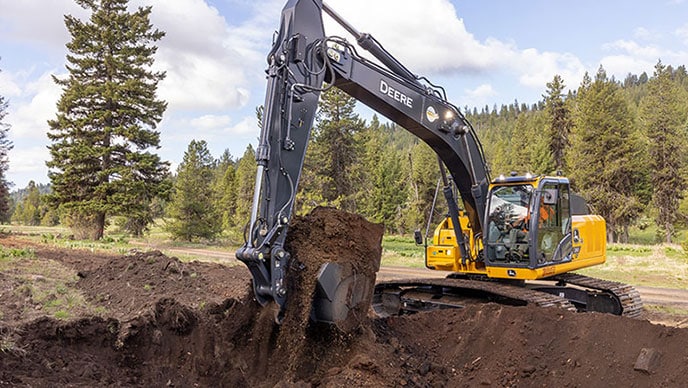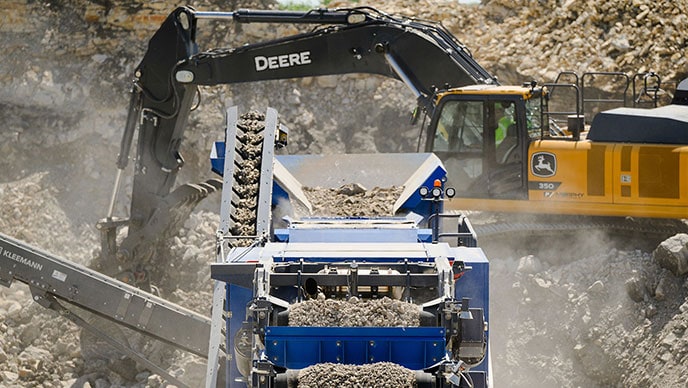JOHN DEERE AND THE WIRTGEN GROUP: WHERE RUGGED RELIABILITY MEETS THE ROAD
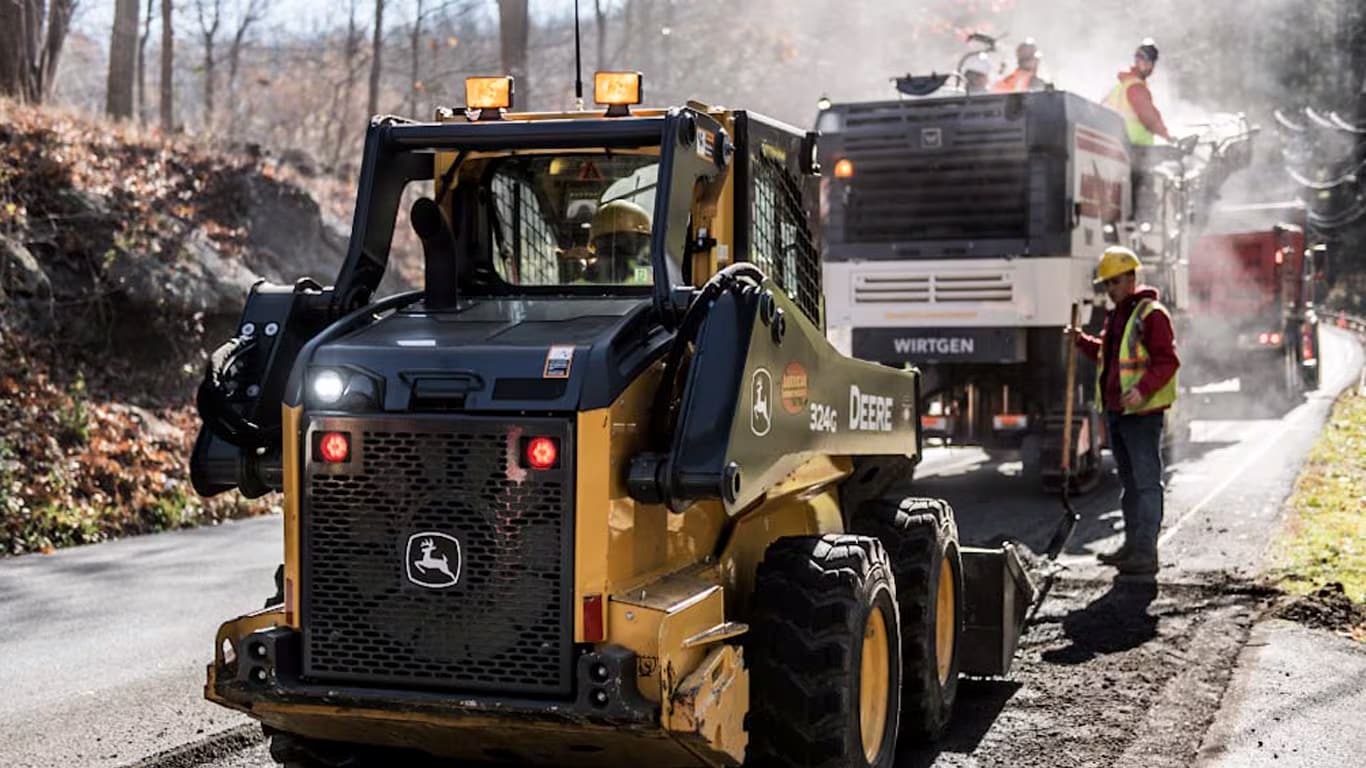
As we know, roads connect the world — and together, John Deere and the Wirtgen Group can connect you to leading solutions for roadbuilding needs.
With decades of expertise and innovation, John Deere and the Wirtgen Group provide a seamless roadbuilding production system experience — from processing, mixing, and paving, to compacting and rehabilitating. Together, we provide you with the equipment you need to clear the site, break up boulders, grade the surface, or knock out any other road construction task in between.
How can John Deere and the Wirtgen Group assist you with roadbuilding?
John Deere and the Wirtgen Group are leaders in roadbuilding solutions, boasting a broad range of equipment to help you check off any roadbuilding task and beyond — from excavators, backhoes, wheel loaders, compact track loaders, skid steers, dozers, motor graders, and articulated dump trucks (ADTs), to pavers, crushers, screeners, milling machines, and more.
Together, we also ensure you get the most out of our equipment — and that means delivering next-level efficiency. Designed for each jobsite task, here are just a few other ways Deere and the Wirtgen Group equipment can help you get the job done.
- John Deere is a global leader in the delivery of agricultural, construction, and forestry equipment, and the Wirtgen Group is a member of the John Deere family. The Wirtgen Group's five premium brands — including Wirtgen, Vögele, Hamm, Kleemann, and Benninghoven — serve the road construction, quarry, and aggregate sectors. Paired with Deere's tough, technology-enabled products, this equipment works to serve the growing need for infrastructure development and improvements worldwide.
- John Deere and the Wirtgen Group equipment is built to work together and stay connected through John Deere Operations Center™. This technology provides critical machine data, tracks utilization, sends diagnostic alerts, and more while also allowing you to organize and view your fleet all in one place — even by jobsite level.
- Operations Center also enables John Deere Connected Support™, which keeps your dealer and factory teams in the know by leveraging a suite of tools designed to improve the profitability of your equipment.
Which roadbuilding tasks do John Deere and the Wirtgen Group help complete?
While road construction involves installing asphalt, concrete, or other materials to create a smooth surface for vehicles, we all know it's much more complicated than that. It involves many phases that involve complex projects of their own.
Excavating, road grading, and paving
Before a drop of asphalt is poured, you need to build a foundation. Without it, the road will lack durability, especially as the surface material begins to show signs of wear. Excavating and grading involve preparing the land by moving soil to flatten, build up, and slope the road location.
- Excavating removes large materials and obstacles from the site, including boulders, trees, stumps, and other debris. It's also important for digging holes and irrigation trenches, piling dirt around the site, and sloping the land to meet the needs of the road.
- Grading is the process of shaping or leveling the earth. Contractors and engineers consider multiple factors before grading, including the type of soil, soil quality, and erosion. In addition, when grading concrete, gravel, or asphalt roads, professionals must consider factors like angle, pitch, crowning, and drainage to create safe driving conditions. For example, the road's surface can't be too high in the middle and must drain properly to minimize cracks, potholes, and pooling of water.
- Paving typically involves multiple base layers plus the main surface. Roads can have rigid or flexible pavements. Rigid pavements — made up of a concrete slab over a thin granular base with an asphalt or similar topping — tend to have lower maintenance costs and longer lifespans. Flexible pavements tend to have lower construction costs and a greater ability to expand and contract with temperature fluctuations.
What else does roadbuilding entail?
However, excavating, grading, and paving are not the only steps in the process. Let's take a brief look at the five phases of road construction — including what happens before ground is even broken.
Phase 1 — Planning. This multifaceted step involves everything from site evaluation to project design, including a review of the current soil/material on site, scheduling, and logistics, such as securing the proper equipment, labor, and subcontractors.
Phase 2 — Earthworks. This phase begins with site preparation to clear dirt, trees, and other vegetation. Some of what is removed may remain onsite to be used for erosion control or backfill. Before grading begins, the subgrade is prepared by adding or removing rock and dirt as necessary. This is known as "cut and fill." Next will be the grading of the land and compacting to make sure the road has a stable foundation.
Earthworks equipment needs may include motor graders, excavators, crawler loaders, crawler dozers, scrapers, dump trucks, backhoes, and skid steers.
Phase 3 — Aggregate. Natural crushed stone and recycled materials in graded grain sizes are used as standard aggregate for concrete, as well as for base, binder, and surface courses in road and civil construction. Before natural stone or recycling material can be turned into standard compliant aggregates for road and civil construction, it must be crushed and screened. The processing of recycled asphalt contributes to the conservation of natural resources and has advantages for the mix prices.
Crews will add a layer to the subgrade, usually called the aggregate or rock layer. A motor grader or crawler is often used to create a crown in the road surface for proper drainage. After grading is complete, the aggregate is compacted to solidify the base.
Aggregate equipment needs may include motor graders, crawler loaders, articulated dump trucks, and dozers.
Phase 4 — Asphalt mixing. A thermal mixing process is required to turn aggregates and bitumen into asphalt for road construction purposes. An asphalt mixing plant is therefore indispensable. We generally differentiate between two types of processes in asphalt production: continuous production and discontinuous or batch production. Whether transportable or stationary, Benninghoven, the specialist for asphalt mixing plants, offers tailor-made solutions for discontinuous asphalt production. Ciber is the Wirtgen Group brand that specializes in continuous asphalt production.
Phase 5 — Paving. For asphalt roads, including new road construction and road rehabilitation, trucks will bring in the hot asphalt mix. A paver pushes the truck at a slow speed to distribute the asphalt at the proper depth, while a screed ensures a uniformly sealed and graded surface texture . A roller follows the paver to create optimal compaction.
For concrete roads, the process is more time consuming and labor intensive. A placer machine allows a concrete truck or dump truck to unload directly onto a conveyor belt. The belt places the concrete aggregate material and begins to spread it. Then, a slipform paver moves along to smooth the concrete. Next, a texture curing machine gives the concrete pavement the desired surface texture, applying a dispersion which prevents the surface and edges from drying too quickly.
The specified surface texture is achieved with a brush. Alternatively, a burlap or synthetic turf can be drawn across the concrete pavement in a longitudinal direction. Automatic crown adjustment and a film unwinder round off the features of the machine. After the concrete has dried, saw cuts or expansion joints are made to allow the concrete to expand and contract with temperature changes.
John Deere's and the Wirtgen Group's rugged and reliable machines provide the power you need for a wide variety of these jobs. From site preparation to finishing up the pavement, they're ready to work harder so you can work smarter — and we'll help you choose the right equipment for the job.
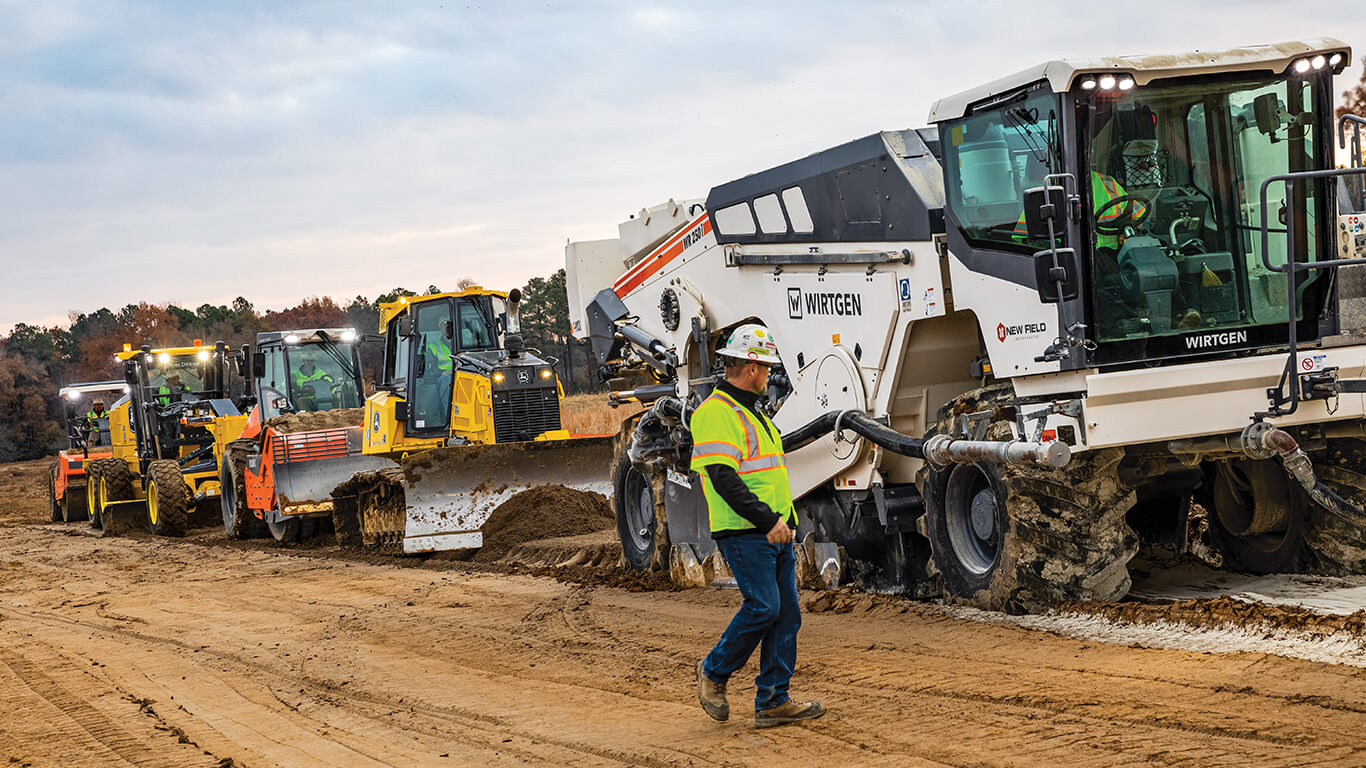
What equipment do John Deere and the Wirtgen Group have to offer for your jobsite?
Throughout each step of the roadbuilding process, John Deere and the Wirtgen Group have a machine to help you carry out the work. Want to learn more about the equipment that'll help you get the job done? Take a closer look at some of the machines and attachments below and select a model for specifications and more details.
What else makes John Deere and Wirtgen Group equipment great additions to your fleet?
From brand-new roads to resurfaced neighborhood streets, and everything in between, we'll help you choose the right earthmoving, excavation, paving, and grading equipment for the job so you can focus on getting it done.
We know it takes more than the right equipment to make your business successful. That's why we also offer highly trained technicians and specialists, parts whenever and wherever you need them, and more. Our expansive, world-class John Deere dealer network helps keep your Deere and Wirtgen Group equipment up and running while helping you decrease costs, increase uptime, and stay on top of your operations.
Ready to add John Deere and the Wirtgen Group roadbuilding equipment to your fleet? Contact your local John Deere dealer or the Wirtgen Group dealer for details today.
